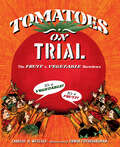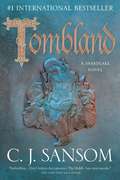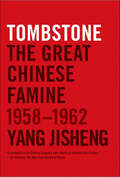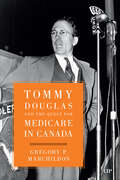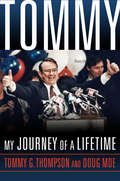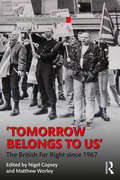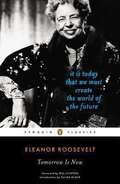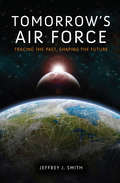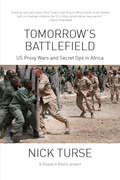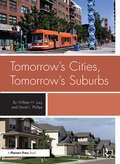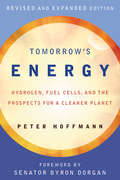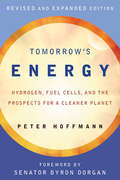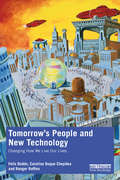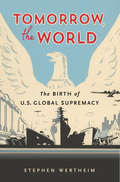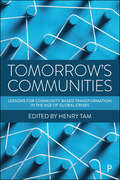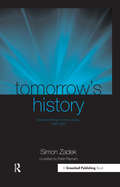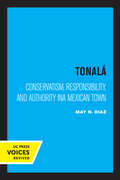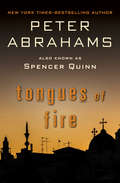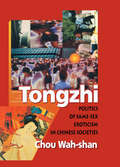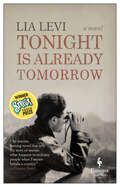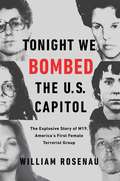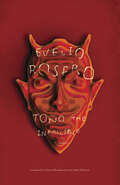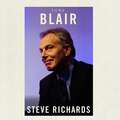- Table View
- List View
Tomatoes on Trial: The Fruit v. Vegetable Showdown
by Lindsay H. MetcalfIs a tomato a fruit or a vegetable? The US Supreme Court takes on the case in this juicy history picture book for kids ages 7 to 10.In the late 1800s, American produce king John Nix just wanted to sell tomatoes. But when import taxes on popular vegetables impacted his profits, he knew he had to remedy the situation. Nix set out to prove that tomatoes, which have seeds and grow on vines, were clearly fruits. That was the claim Nix argued all the way to the US Supreme Court. With Nix on Team Fruit, and the US government on Team Vegetable, both sides slung definition after definition in an epic, legal food fight. This little-known agriculturally-based story from American history will fascinate young readers and encourage them to take a stand and defend their opinions.
Tombland (The\shardlake Ser. #7)
by C. J. Sansom"The latest in what is easily one of the best ongoing mystery series currently being published" (Christian Science Monitor), a mystery for fans of Hilary Mantel, set in a time of great political upheaval in Tudor-era England.Spring, 1549. Two years after the death of Henry VIII, England is sliding into chaos.The nominal king, Edward VI, is eleven years old. His uncle, Edward Seymour, Lord Hertford, rules as Edward's regent and Protector. In the kingdom, radical Protestants are driving the old religion into extinction, while the Protector's prolonged war with Scotland has led to hyperinflation and economic collapse. Rebellion is stirring among the peasantry.Matthew Shardlake has been working as a lawyer in the service of Henry's younger daughter, the lady Elizabeth. The gruesome murder of one of Elizabeth's distant relations, rumored to be politically murdered, draws Shardlake and his companion Nicholas to the lady's summer estate, where a second murder is committed.As the kingdom explodes into rebellion, Nicholas is imprisoned for his loyalty, and Shardlake must decide where his loyalties lie -- with his kingdom, or with his lady?
Tombstone: The Great Chinese Famine, 1958–1962
by Yang JishengA veteran journalist presents “an epic account of the worst famine in history . . . a landmark in the Chinese people’s own efforts to confront their history” (Ian Johnson, The New York Review of Books).An estimated thirty-six million Chinese men, women, and children starved to death during China’s Great Leap Forward in the late 1950s and early ‘60s. One of the greatest tragedies of the twentieth century, the famine is poorly understood, and in China is still euphemistically referred to as “the three years of natural disaster.”As a journalist with privileged access to official and unofficial sources, Yang Jisheng spent twenty years piecing together the events that led to mass nationwide starvation, including the death of his own father. Finding no natural causes, Yang attributes responsibility for the deaths to China’s totalitarian system and the refusal of officials at every level to value human life over ideology and self-interest.Tombstone is a testament to inhumanity and occasional heroism that pits collective memory against the historical amnesia imposed by those in power. Stunning in scale and arresting in its detailed account of the staggering human cost of this tragedy, Tombstone is written both as a memorial to the lives lost—an enduring tombstone in memory of the dead—and in hopeful anticipation of the final demise of the totalitarian system.
Tommy Douglas and the Quest for Medicare in Canada
by Gregory MarchildonHow and why was universal health coverage implemented so early in a poverty-stricken province in Canada? Why was its design so faithfully replicated in the national standards that ultimately shaped Medicare across the rest of Canada? Seeking to answer these questions, Tommy Douglas and the Quest for Medicare in Canada explores the history of universal health care through the life of Canadian politician Tommy Douglas, identifying the pivotal moments and decisions that led to the establishment of Medicare in Canada. The book traces the origins of Medicare back to the 1930s Depression and its devastating impact on the Prairie populations. Marchildon examines how Tommy Douglas and a new generation of reformers, radicalized by the Depression, prioritized socialized health care. The book reveals how, as the provincial party leader, Douglas leveraged support from both local and external allies to rapidly implement universal hospital insurance and lay the groundwork for a new health system. Despite strong opposition from physician and business lobbies, Douglas continued to pressure the government for federal cost-sharing of universal health coverage. Drawing on archival sources including speeches, television broadcasts, and cabinet documents, Tommy Douglas and the Quest for Medicare in Canada illuminates how Douglas’s vision, leadership, and coalition-building among unions were crucial to the successful establishment of Medicare in Canada.
Tommy: My Journey of a Lifetime
by Doug Moe Tommy G. ThompsonThe many facets of Tommy G. Thompson—small-town grocer's son, brash campaigner with a common touch, shrewd political strategist, savvy policy wonk, and ebullient promoter of Wisconsin—come across vividly in these pages. Thompson, with journalist Doug Moe, traces his journey from boyhood to politics to the world stage, including his unprecedented four terms as Wisconsin governor, his service as a cabinet secretary under President George W. Bush, and his continuing work in global efforts to fight AIDS, tuberculosis, and malaria. Personal and revealing stories punctuate the biographical details and policy discussions. Here is Tommy as a young man, just happening to be on the National Mall in 1964 when Dr. Martin Luther King told the nation "I have a dream." Here is Tommy as Wisconsin governor, struggling to start a Harley-Davidson motorcycle before leading "a pack of Hell's Republicans" on a ride through the state. Here is Tommy in Washington after the 9/11 attacks, slipping out of a secure bunker (in defiance of orders) to aid the emergency medical response. Thompson speaks candidly of his achievements and regrets, including his involvement with welfare reform, school choice, land conservancy, prisons, the financing of Miller Park, stem cell research, and health insurance.
Tomorrow Belongs to Us: The British Far Right since 1967 (Routledge Studies in Fascism and the Far Right)
by Nigel Copsey Matthew WorleyThis book traces the varied development of the far right in Britain from the formation of the National Front in 1967 to the present day. Experts draw on a range of disciplinary and methodological perspectives to provide a rich and detailed account of the evolution of the various strands of the contemporary far right over the course of the last fifty years. The book examines a broad range of subjects, including Holocaust denial, neo-Nazi groupuscularity, transnational activities, ideology, cultural engagement, homosexuality, gender and activist mobilisation. It also includes a detailed literature review. This book is essential reading for students of fascism, racism and contemporary British cultural and political history.
Tomorrow Is Now
by Bill Clinton Eleanor Roosevelt Allida BlackAvailable again in time for election season, Eleanor Roosevelt's most important book-a battle cry for civil rights. As relevant and influential now as it was when first published in 1963, Tomorrow Is Now is Eleanor Roosevelt's manifesto and her final effort to move America toward the community she hoped it would become. <P><P>In bold, blunt prose, one of the greatest First Ladies of American history traces her country's struggle to embrace democracy and presents her declaration against fear, timidity, complacency, and national arrogance. An open, unrestrained look into her mind and heart as well as a clarion call to action, Tomorrow Is Now is the work Eleanor Roosevelt willed herself to stay alive to finish writing. For this edition, former U.S. President Bill Clinton contributes a new foreword and Roosevelt historian Allida Black provides an authoritative introduction focusing on Eleanor Roosevelt's diplomatic career.<P>For more than sixty-five years, Penguin has been the leading publisher of classic literature in the English-speaking world. With more than 1,500 titles, Penguin Classics represents a global bookshelf of the best works throughout history and across genres and disciplines. <P>Readers trust the series to provide authoritative texts enhanced by introductions and notes by distinguished scholars and contemporary authors, as well as up-to-date translations by award-winning translators.From the Trade Paperback edition.
Tomorrow They Won't Dare to Murder Us: A Novel
by Joseph AndrasLyrical and radical, a debut novel that created a sensation in FranceWinner of the Prix Goncourt for first novel, one of the most prestigious literary awards in FranceA young revolutionary plants a bomb in a factory on the outskirts of Algiers during the Algerian War. The bomb is timed to explode after work hours, so no one will be hurt. But the authorities have been watching. He is caught, the bomb is defused, and he is tortured, tried in a day, condemned to death, and thrown into a cell to await the guillotine. A routine event, perhaps, in a brutal conflict that ended the lives of more than a million Muslim Algerians.But what if the militant is a &“pied-noir&”? What if his lover was a member of the French Resistance? What happens to a &“European&” who chooses the side of anti-colonialism?By turns lyrical, meditative, and heart-stoppingly suspenseful, this novel by Joseph Andras, based on a true story, was a literary and political sensation in France, winning the Prix Goncourt for First Novel and being acclaimed by Le Monde as &“vibrantly lyrical and somber&” and by the journal La Croix as a &“masterpiece&”.
Tomorrow's Air Force: Tracing the Past, Shaping the Future
by Jeffrey J. Smith&“A bold and courageous clarion call from a highly respected serving officer that should be read and heeded by anyone interested in the future of the US Air Force.&” —Everett Dolman, School of Advanced Airpower Studies Looking ahead to future airpower requirements, this engaging and groundbreaking book on the history and future of American combat airpower argues that the US Air Force must adapt to the changes that confront it or risk decline into irrelevance. To provide decision makers with the necessary analytical tools, Jeffrey J. Smith uses organizational modeling to help explain historical change in the USAF and to anticipate change in the future. While the analysis and conclusions it offers may prove controversial, the book aims to help planners make better procurement decisions, institute appropriate long-term policy, and better organize, train, and equip the USAF for the future. &“Those airmen willing to actively engage such discussions would do well to turn to Smith&’s book as the basic point of departure for debates concerning the intricate relationship between the Air Force&’s past, present, and future.&” —Strategic Studies Quarterly &“This book is &‘out of the box&’ thinking and is very timely given the recent and evolving Air Force roles and missions.&” —Brigadier General Al Rachel, USAF (Ret.) &“Colonel Smith has a great grasp of what the forthcoming debate will require. The Congress must reduce the spending at the very time our enemies are overtaking our capabilities. The debate needs to be engaged now. This book comes on the scene at just the right time.&” —Denny Smith former US Congressman and Air Force F-4 pilot
Tomorrow's Cities, Tomorrow's Suburbs
by William LucyCities ruled the first half of the 20th century; the second half belonged to the suburbs. Will cities become dominant again? Can the recent decline of many suburbs be slowed? This book predicts a surprising outcome in the decades-long tug-of-war between urban hubs and suburban outposts. The authors document signs of resurgence in cities and interpret omens of decline in many suburbs. They offer an extensive analysis of the 2000 census, with insights into the influence of income disparities, housing age and size, racial segregation, immigration, and poverty. They also examine popular perceptions-and misperceptions-about safety and danger in cities, suburbs, and exurbs that affect settlement patterns. This book offers evidence that the decline of cities can continue to be reversed, tempered by a warning of a mid-life crisis looming in the suburbs. It also offers practical policies for local action, steps that planners, elected officials, and citizens can take to create an environment in which both cities and suburbs can thrive.
Tomorrow's Energy
by Peter HoffmannHydrogen is the most abundant element in the universe. An invisible, tasteless, colorless gas, it can be converted to nonpolluting, zero-emission, renewable energy. When burned in an internal combustion engine, hydrogen produces mostly harmless water vapor. It performs even better in fuel cells, which can be 2. 5 times as efficient as internal-combustion engines. Zero-emission hydrogen does not contribute to CO2-caused global warming. Abundant and renewable, it is unlikely to be subject to geopolitical pressures or scarcity concerns. In this new edition of his pioneering book Tomorrow's Energy, Peter Hoffmann makes the case for hydrogen as the cornerstone of a new energy economy. Hoffmann covers the major aspects of hydrogen production, storage, transportation, fuel use, and safety. He explains that hydrogen is not an energy source but a carrier, like electricity, and introduces the concept of "hydricity," the essential interchangeability of electricity and hydrogen. He brings the hydrogen story up to date, reporting on the latest developments, including new hydrogen and fuel-cell cars from GM, Daimler, BMW, Honda, and Toyota. He describes recent political controversies, including Obama administration Energy Secretary (and Nobel laureate in Physics) Steven Chu's inexplicable dismissal of hydrogen--which puts him at odds with major automakers, German Chancellor Angela Merkel, and others. Our current energy system is a complex infrastructure, and phasing in hydrogen will take effort and money. But if we consider the real costs of fossil fuels--pollution and its effects, international tensions over gas and oil supplies, and climate change--we would be wise to promote its development.
Tomorrow's Energy, revised and expanded edition: Hydrogen, Fuel Cells, and the Prospects for a Cleaner Planet (The\mit Press Ser.)
by Peter HoffmannHow the use of nonpolluting, zero-emission hydrogen as fuel could be the cornerstone of a new energy economy.Hydrogen is the most abundant element in the universe. An invisible, tasteless, colorless gas, it can be converted to nonpolluting, zero-emission, renewable energy. When burned in an internal combustion engine, hydrogen produces mostly harmless water vapor. It performs even better in fuel cells, which can be 2.5 times as efficient as internal-combustion engines. Zero-emission hydrogen does not contribute to CO2-caused global warming. Abundant and renewable, it is unlikely to be subject to geopolitical pressures or scarcity concerns. In this new edition of his pioneering book Tomorrow's Energy, Peter Hoffmann makes the case for hydrogen as the cornerstone of a new energy economy.Hoffmann covers the major aspects of hydrogen production, storage, transportation, fuel use, and safety. He explains that hydrogen is not an energy source but a carrier, like electricity, and introduces the concept of “hydricity,” the essential interchangeability of electricity and hydrogen. He brings the hydrogen story up to date, reporting on the latest developments, including new hydrogen and fuel-cell cars from GM, Daimler, BMW, Honda, and Toyota. He describes recent political controversies, including Obama administration Energy Secretary (and Nobel laureate in Physics) Steven Chu's inexplicable dismissal of hydrogen—which puts him at odds with major automakers, German Chancellor Angela Merkel, and others.Our current energy system is a complex infrastructure, and phasing in hydrogen will take effort and money. But if we consider the real costs of fossil fuels—pollution and its effects, international tensions over gas and oil supplies, and climate change—we would be wise to promote its development.
Tomorrow's People and New Technology: Changing How We Live Our Lives
by Felix Dodds Carolina Duque Chopitea Ranger RuffinsAs we witness a series of social, political, cultural, and economic changes/disruptions this book examines the Fourth Industrial Revolution and the way emerging technologies are impacting our lives and changing society. The Fourth Industrial Revolution is characterised by the emergence of new technologies that are blurring the boundaries between the physical, the digital, and the biological worlds. This book allows readers to explore how these technologies will impact peoples’ lives by 2030. It helps readers to not only better understand the use and implications of emerging technologies, but also to imagine how their individual life will be shaped by them. The book provides an opportunity to see the great potential but also the threats and challenges presented by the emerging technologies of the Fourth Industrial Revolution, posing questions for the reader to think about what future they want. Emerging technologies, such as robotics, artificial intelligence, big data and analytics, cloud computing, nanotechnology, biotechnology, the Internet of Things, fifth-generation wireless technologies (5G), and fully autonomous vehicles, among others, will have a significant impact on every aspect of our lives, as such this book looks at their potential impact in the entire spectrum of daily life, including home life, travel, education and work, health, entertainment and social life. Providing an indication of what the world might look like in 2030, this book is essential reading for students, scholars, professionals, and policymakers interested in the nexus between emerging technologies and sustainable development, politics and society, and global governance.
Tomorrow, the World: The Birth Of U. S. Global Supremacy
by Stephen WertheimA new history explains how and why, as it prepared to enter World War II, the United States decided to lead the postwar world.For most of its history, the United States avoided making political and military commitments that would entangle it in European-style power politics. Then, suddenly, it conceived a new role for itself as the world’s armed superpower—and never looked back. In Tomorrow, the World, Stephen Wertheim traces America’s transformation to the crucible of World War II, especially in the months prior to the attack on Pearl Harbor. As the Nazis conquered France, the architects of the nation’s new foreign policy came to believe that the United States ought to achieve primacy in international affairs forevermore.Scholars have struggled to explain the decision to pursue global supremacy. Some deny that American elites made a willing choice, casting the United States as a reluctant power that sloughed off “isolationism” only after all potential competitors lay in ruins. Others contend that the United States had always coveted global dominance and realized its ambition at the first opportunity. Both views are wrong. As late as 1940, the small coterie of officials and experts who composed the U.S. foreign policy class either wanted British preeminence in global affairs to continue or hoped that no power would dominate. The war, however, swept away their assumptions, leading them to conclude that the United States should extend its form of law and order across the globe and back it at gunpoint. Wertheim argues that no one favored “isolationism”—a term introduced by advocates of armed supremacy in order to turn their own cause into the definition of a new “internationalism.”We now live, Wertheim warns, in the world that these men created. A sophisticated and impassioned narrative that questions the wisdom of U.S. supremacy, Tomorrow, the World reveals the intellectual path that brought us to today’s global entanglements and endless wars.
Tomorrow’s Communities: Lessons for Community-based Transformation in the Age of Global Crises
by Henry TamIt is increasingly recognised that instead of relying on top-down commands or leaving individuals to their own devices, communities should be given a role in tackling challenges exacerbated by global crises. Written by a team of leading experts with in-depth knowledge and on-the-ground experience, this book sets out why and how people’s lives can be positively transformed through diverse forms of community involvement. This book critically explores examples from around the world of how communities can become more collaborative and resilient in dealing with the problems they face, and provides an invaluable guide to what a holistic policy agenda for community-based transformation should encompass.
Tomorrow’s History: Selected Writings of Simon Zadek, 1993-2003
by Simon ZadekThe last ten years have seen an extraordinary transformation in how business has to account for itself. Today, the air is thick with the buzz of corporate responsibility (CR) leaders, innovators and practitioners. Conferences and publications on the topic are in abundance: the tip of an iceberg that has become a fast-growth industry. Many of those companies and service providers most vocal in distancing themselves from early experimentation have proved the strongest advocates of sustainability reporting, often winning applause and coveted awards in the process. Even companies from controversial sectors such as alcohol, cigarettes and gambling have joined the party – running up bills of tens of millions of dollars in demonstrating their new-found faith for CR. It has not always been like this. As one of the architects of the burgeoning CR movement, Simon Zadek has always been a prolific writer and contributor of ideas. The evolution of his thoughts on new economics, corporate accountability, stakeholder dialogue, social and ethical auditing and reporting have attracted consistent attention – never more than today. In this unique anthology, Zadek crystallises his key work from the last decade into a coherent and fascinating whole, which, read together, provide a context, lens and early history lesson on how CR has become one of the defining business issues of the 21st century. The writings reflect Zadek's involvement with organisations such as the New Economics Foundation, a pioneer in the development of social auditing, sustainability indicators, community finance and much more. They illustrate his contribution in setting up the Ethical Trading Initiative, and AccountAbility (where he is presently the CEO), in working with companies such as The Body Shop and Ben & Jerry's through to Nike, BT and many other civil-society organisations. The book contains 33 pieces, which are split into six sections: "The Economics of Utopia"; "Civil Society, Power and Accountability"; "Accounting for Change"; "The Civil Corporation"; "Partnership Alchemy"; and "Responsible Competitiveness". It will be an invaluable resource for anyone wishing develop an understanding of why corporate responsibility is where it is today and where it might end up tomorrow.
Tonalà: Conservatism, Responsibility, and Authority in a Mexican Town
by May N. DiazThis title is part of UC Press's Voices Revived program, which commemorates University of California Press’s mission to seek out and cultivate the brightest minds and give them voice, reach, and impact. Drawing on a backlist dating to 1893, Voices Revived makes high-quality, peer-reviewed scholarship accessible once again using print-on-demand technology. This title was originally published in 1966.
Tongues of Fire
by Peter AbrahamsA chilling and explosive tale of revenge set in the Middle East from acclaimed suspense novelist Peter Abrahams, aka Spencer Quinn, author of the Chet and Bernie Mysteries After his unit is decimated in the Israeli war, Lieutenant Isaac Rehv returns to Haifa to find his family savagely murdered. Torn apart with grief and rage, he vows that his enemies--and the enemies of Israel--will pay. Months later, Rehv, who is a former literary scholar and professor of Arabic literature, has moved to America and is waiting tables at a local café in Manhattan. There, a chance encounter with a member of the Israeli resistance called Haganah and a botched assassination attempt will sow the seeds of a brilliantly orchestrated revenge plot. As Rehv prepares to unleash his secret weapon on an unsuspecting Islamic world, a terrorist watch group, led by a former CIA agent named Krebs, follows his every move. But Krebs may be too late to prevent the coming destruction.
Tongzhi: Politics of Same-Sex Eroticism in Chinese Societies
by Edmond J Coleman Wah-Shan ChouTongzhi: Politics of Same-Sex Eroticism in Chinese Societies examines Chinese societies where the family-kinship system, rather than sexuality, is taken as the basis of an individual's identity. With Tongzhi, you will come to understand the variations of same-sex erotica in different Chinese societies. Examining past and present treatment of the subject, including instances of discrimination against homosexuals, Tongzhi explores same-sex eroticism in China, Hong Kong, and Taiwan, and explains the variations of categories and experiences of tongzhi in these countries. Just what is Tongzhi?Tongzhi is the most popular contemporary Chinese word for lesbians, bisexuals, and gay people. The word, which has very positive historical references, was a Chinese translation from the Soviet communist term comrade. It was appropriated by a Hong Kong gay activist in 1989 for the first Lesbian and Gay Film Festival in Hong Kong by its organizers, who wanted to employ an indigenous representation of same-sex eroticism. The term 'homosexual’was inappropriate because of its use as a medical term denoting sickness and pathology. Within a few years, tongzhi became a widely used term in Hong Kong and Taiwan and is often used interchangeably with the English term gay. But terms such as gay, lesbian, and queer are Anglo-Saxon in origin, with specific histories that cannot capture the indigenous features of Chinese same-sex relationships. Tongzhi implies and includes much more. S/Mers, transvestites, and other fetishists who are members of the Chinese sexual counterculture who may be quite heterosexual are also tongzhi. And the term has meaning beyond the sexual: it embodies a strong sentiment for integrating the sexual (legitimizing same-sex love), the political (sharing the goals of fighting heterosexism) and the cultural (reappropriating their Chinese identity). Tongzhi brings you fascinating insight into: the history of same-sex eroticism in China coming out in Chinese society how colonialism has affected sexual nonconformists in this region racial and sexual dynamics in Colonial Hong Kong the cultural politics of being a tomboy/girl in modern Hong Kong “queering the mainstream” with tongzhi identity politics sexual/cultural diversities and differences among contemporary Chinese societies . . . and much more!Tongzhi shows how culture influences identity and demonstrates how you can develop relevant strategies for successful activist movements. Discussing political movements for gay/lesbian/bisexual rights and the societal implications of same-sex eroticism, this intelligent book provides you with a clear understanding of the attitudes toward and meanings of being tongzhi today.
Tonight Is Already Tomorrow: A Novel
by Lia LeviA prize-winning novel inspired by true WWII events. “An intense, moving book that tells the story of stories: what happens when Fascism befalls a country.” —Esquire (Italy)1938. Thirty-two countries convene to decide how to deal with the influx of Jews fleeing Nazi Germany and Austria. Good intentions abound, but no government is willing to accept the refugees. At the same time, Fascist Italy is introducing its infamous racial laws.In this new, stirring novel Lia Levi portrays Italy’s tragic past through the story of a Jewish family, plagued by doubts, passions, weaknesses, impulses, and betrayals. Set in Genoa in the years of the racial laws, the novel follows a would-be genius son, a disappointed, regretful mother, a wise but irresolute father, an eccentric grandfather, nosy uncles, cousins who are always coming and going. How do individuals face the darkest periods of history? Will anyone rebel against the spread of violence and discrimination? Will anyone welcome them if this family flees certain persecution?A harrowing story that resonates with special urgency in our time.“Levi has a fluid style and a clear talent for storytelling.” —Kirkus Reviews“A gripping story of childhood during Fascism.” —Rai Cultura“The storytelling is vivid and accessible, engaging and compelling. Levi gives her readers an opportunity to immerse themselves in the day-to-day life of a family subject to the racial laws in Italy during Fascism.” —la Repubblica
Tonight We Bombed the U.S. Capitol: The Explosive Story of M19, America's First Female Terrorist Group
by William RosenauIn a shocking, never-before-told story from the vaults of American history, Tonight We Bombed the US Capitol takes a close look at the explosive hidden history of M19—the first and only domestic terrorist group founded and led by women—and their violent fight against racism, sexism, and what they viewed as Ronald Reagan&’s imperialistic vision for America.In 1981, President Ronald Reagan announced that it was &“morning in America.&” He declared that the American dream wasn&’t over, but the United States needed to lower taxes, shrink government control, and flex its military muscles abroad to herald what some called &“the Reagan Revolution.&” At the same time, a tiny band of American-born, well-educated extremists were working for a very different kind of revolution. By the end of the 1970s, many radicals had called it quits, but six veteran women extremists came together to finish the fight. These women had spent their entire adult lives embroiled in political struggles: protesting the Vietnam War, fighting for black and Native American liberation, and confronting US imperialism. They created a new organization to wage their war: The May 19th Communist Organization, or &“M19,&” a name derived from the birthday shared by Malcolm X and Ho Chi Minh, two of their revolutionary idols. Together, these six women carried out some of the most daring operations in the history of domestic terrorism—from prison breakouts and murderous armed robberies, to a bombing campaign that wreaked havoc on the nation&’s capital. Three decades later, M19&’s actions and shocking tactics still reverberate for many reasons, but one truly sets them apart: unlike any other American terrorist group before or since, M19 was created and led by women. Tonight We Bombed the US Capitol tells the full story of M19 for the first time, alongside original photos and declassified FBI documents. Through the group&’s history, intelligence and counterterrorism expert William Rosenau helps us understand how homegrown extremism—a threat that still looms over us today—is born.
Tono the Infallible
by Evelio RoseroAn unforgettable yet humane novel that takes us into the heart of Colombia’s brutal society, by one of the country’s most renowned writers I was alone when someone pounded on my door. Who could it be? So begins Tono the Infallible, Evelio Rosero’s gripping novel about an intense relationship between a writer and a sociopath. Visited by his friend (a kind of Colombian Rasputin) seemingly at the verge of death, the writer, Eri, looks back on the arc of both of their lives. Unique in both its tone and its structure, the novel takes us from their student days (school fights, playground revelations, and an unforgettable trip to the seaside) into their adult years, involving rumors of a hippie cult and a bizarre raucous theater exhibit of history’s most violent crimes. Tono uses his charm and wealth—as well as reputed magical powers—to manipulate others, but it isn’t until the end of the book that the devastating truth is revealed—and how true is it? Reminiscent of the fiction of Roberto Bolano and the films of Alfonso Cuarón, this brilliant novel takes us into the heart of his country’s darkness, creating an unforgettable portrait of a society where humanity still endures, despite its brutality.
Tony Blair: The Prime Ministers Series (The Prime Ministers)
by Steve RichardsWas Tony Blair a visionary, impatiently looking ahead, or a leader trapped by his past: Labour's vote-losing 1980s and the dominance of Margaret Thatcher? Was the party's move to the right under Blair necessary in order for them to win, or could they, after 18 years of Tory rule, have afforded to be more daring, more left-wing, than their leader wished to recognise?In Steve Richards' short, provocative and highly engaging new biography, he argues that Blair was often the opposite of what we remember him being; perceived as a 'moderniser,' he sought to strengthen the traditional institutions that partly define the UK, from the monarchy to the military; while to Margaret Thatcher's public appreciation he partly cemented her economic legacy rather than move on from it. And, while he was viewed as messianic over Iraq, he was in fact being characteristically expedient, clinging to the orthodoxy in which the UK stands shoulder to shoulder with the US in war.But the UK in 2007 was undoubtedly a different country to the one it had been in 1997 - from devolution, which played its part in establishing peace in Northern Ireland, to civil partnerships and a revived NHS, Blair left Britain in a better place than it had been. While his legacy has been overshadowed by the Iraq war, Tony Blair re-establishes a more rounded view of his time in office, and shows that the challenges facing Blair were the ones that still face Labour today.
